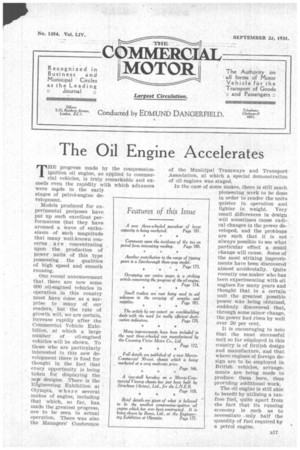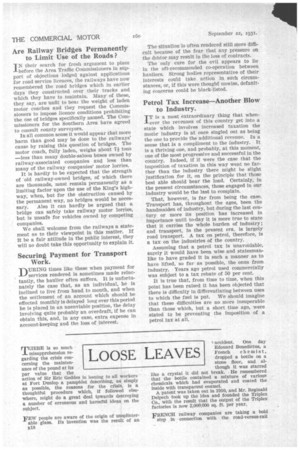The Oil Engine Accelerates
Page 35

Page 36

If you've noticed an error in this article please click here to report it so we can fix it.
THE progress made by the compressionignition oil engine, as applied to commercial vehicles, is truly remarkable and exceeds even the rapidity with which advances were made in the early stages of petrol-engine de velopment.
Models produced for experimental purposes have put up such excellent performances that they have aroused a wave of enthusiasm of such magnitude that many well-known concerns are coneentrating upon the . production of power • units of this. type possessing. the qualities of high speed and smooth running.
Our, recent announcement that there are now some, 600 'oil-engined vehicles in operation. in this country must have come, as a• surprise to many • ofreaders, but the rat of growth will, we are certain, increase rapidly after the Commercial Vehicle Exhibition, at which a large number of oil-engined vehicles will be shown. To those who are particularly interested in this new development there is food for thought in the fact that every opportunity is being taken for displaying the ilep designs: There is the Engineering Exhibition at Olympia. where several makes of engine, including that which, so far, has. made the greatest progress, are to be seen in actual operation. There was also the Managers' Conference of the Municipal Tramways and Transport Association, at which a special demonstration of oil engines was staged.
In the case of some makes, there is still much pioneering work to be done in order to render the units quieter in operation and lighter in weight. Very small differences in design will sometimes cause radical changes in the power developed, and the problems are such that It is not always possible to see what particular effect a small change will cause. Some of the most striking ImproVements have been discovered almost accidentally. Quite recently one maker who has been experimenting with oil engines for many years and thought that in a certain unit the greatest possible power was being obtained, suddenly discovered that, through some minor change, the power had risen by well over 20 per cent.
It is encouraging to note that the most successful unit so far eMployed in this country is of British design and manufacture, and that where engines of foreign design are to be employed in British vehicles, arrangements are being made to produce them here, thus providing additional work.
The oil engine is still able to benefit by utilizing a taxfree fuel, quite apart from the fact that its running economy is such as to necessitate only half the quantity of fuel required by a petrol engine.
Are Railway Bridges Permanently to Limit Use of the Roads ?
TN their search for fresh argument to place -2before the Area Traffic Commissioners in support of objections lodged against applications for road service licences, the railways have now remembered the road bridges which in earlier days they Constructed over their tracks and which they have to maintain. Manyof these, they say, are unfit to bear the weight. Of laden motor coaches and they request the Commissioners to impose licence conditions prohibiting the use of bridges specifically named. The Commissioners for the Southern Area have agreed to consult county surveyors.
In all common sense it would appear that more harm than good may be done to the railways' cause by raising this question of bridges. The motor coach, fully laden, weighs about 71 tons —less than many double-saloon buses owned by railway-associated companies and less than many of the railway companies' motor lorries.
It is hardly to be expected that the strength of 'old railway-owned bridges, of which there are thousands, must remain permanently as a limiting factor upon the use of the King's highway, when, but for the obstruction caused by the permanent way, no bridges would be necessary. Also it can hardly be argued that a bridge can safely take railway motor lorries, but • is unsafe for vehicles owned by competing companies.
We shall welcome from the railways'a statement as to their viewpoint in this matter. If It be a fair attitude in the public interest, they will no doubt take this opportunity to explain it.
Securing Payment for Transport Work.
DURING times like these when payment for services rendered is sometimes made reluctantly, the haulier often suffers. It is unfortunately the case that, as an individual, he is inclined to live from hand to mouth, and when the settlement of an account which should be effected monthly is delayed long over this period he is placed in an unenviable position, the delay involving quite probably an overdraft, if he can obtain this, and, in any case, extra expense in account-keeping and the loss of interest. The situation is often rendered still more difficult because of the fear that any pressure on the debtor may result in the loss of contracts.
The only cure for the evil appears to lie in the oft-recommended co-operation between hauliers. Strong bodies representative of their interests could take action in such circumstances, or, if this were thought unwise, defaulting concerns could he black-listed.
Petrol Tax Increase—Another Blow to Industry.
TT is a most extraordinary thing that when-I-ever the revenues of this country get into a state which involves increased taxation the motbr industry is at once singled out as being the one to provide the additional revenue. In a sense that -is a compliment to the industry. It is a thriving one, and probably, at this moment, one of the most progressive and successful in the country. Indeed, if it were the ease that the imposition of taxation in this way went no farther than the industry there might be slight justification for it, on the principle that those hest able should bear the load. Certainly, in the present circumstances, those engaged in our Industry would be the last to complain.
That, however, is far from being the case. Transport has, throughout the ages, been the handmaiden of industry, but during the last century or more its position has increased in Importance until to-day it is more true to state that it carries the whole burden of Industry; and transport, in the present era, is largely road transport. A tax on petrol, therefore, Is a tax on the industries of the country.
Assuming that a petrol tax is unavoidable, surely it would have been wise and statesmanlike to have graded it in such a manner as to have lifted, so far as possible, the onus from Industry. Years ago petrol used commercially was subject to a tax rebate of Z.-10 per cent.
It is true that, from time to time, when this point has been raised it has been objected that there is difficulty in differentiating between uses to which the fuel is put, We should imagine that these difficulties are no more insuperable than those which, but a short time ago, were stated to be preventing the imposition of a petrol tax at all.




































































































